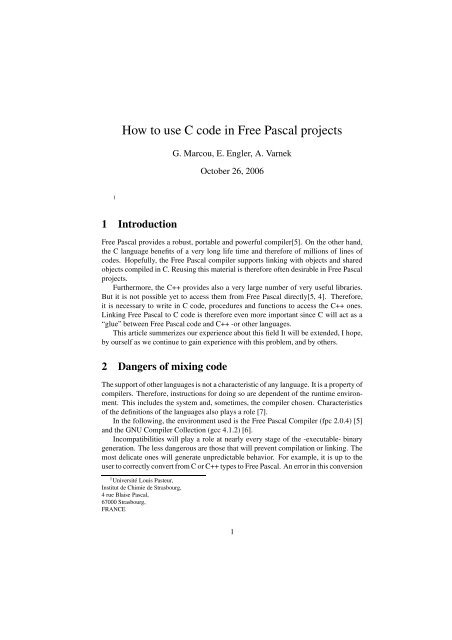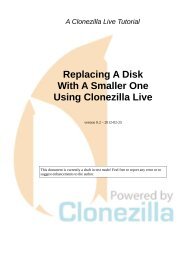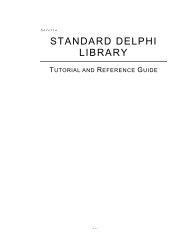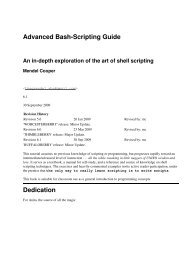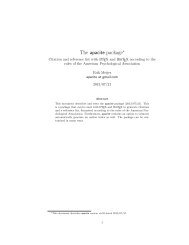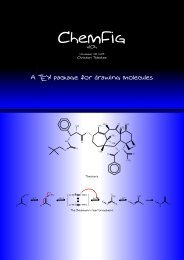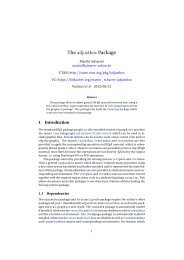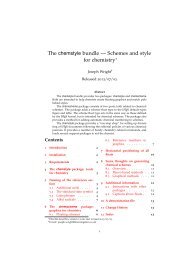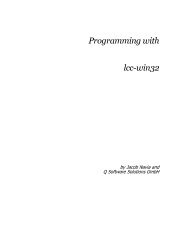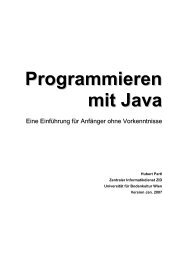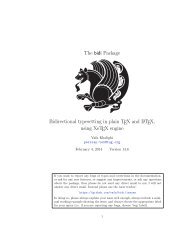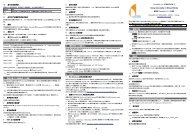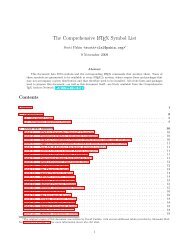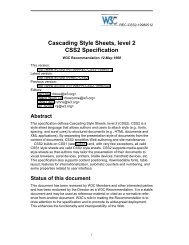How to use C code in Free Pascal projects
How to use C code in Free Pascal projects
How to use C code in Free Pascal projects
You also want an ePaper? Increase the reach of your titles
YUMPU automatically turns print PDFs into web optimized ePapers that Google loves.
<strong>How</strong> <strong>to</strong> <strong>use</strong> C <strong>code</strong> <strong>in</strong> <strong>Free</strong> <strong>Pascal</strong> <strong>projects</strong><br />
G. Marcou, E. Engler, A. Varnek<br />
Oc<strong>to</strong>ber 26, 2006<br />
1<br />
1 Introduction<br />
<strong>Free</strong> <strong>Pascal</strong> provides a robust, portable and powerful compiler[5]. On the other hand,<br />
the C language benefits of a very long life time and therefore of millions of l<strong>in</strong>es of<br />
<strong>code</strong>s. Hopefully, the <strong>Free</strong> <strong>Pascal</strong> compiler supports l<strong>in</strong>k<strong>in</strong>g with objects and shared<br />
objects compiled <strong>in</strong> C. Reus<strong>in</strong>g this material is therefore often desirable <strong>in</strong> <strong>Free</strong> <strong>Pascal</strong><br />
<strong>projects</strong>.<br />
Furthermore, the C++ provides also a very large number of very <strong>use</strong>ful libraries.<br />
But it is not possible yet <strong>to</strong> access them from <strong>Free</strong> <strong>Pascal</strong> directly[5, 4]. Therefore,<br />
it is necessary <strong>to</strong> write <strong>in</strong> C <strong>code</strong>, procedures and functions <strong>to</strong> access the C++ ones.<br />
L<strong>in</strong>k<strong>in</strong>g <strong>Free</strong> <strong>Pascal</strong> <strong>to</strong> C <strong>code</strong> is therefore even more important s<strong>in</strong>ce C will act as a<br />
“glue” between <strong>Free</strong> <strong>Pascal</strong> <strong>code</strong> and C++ -or other languages.<br />
This article summerizes our experience about this field It will be extended, I hope,<br />
by ourself as we cont<strong>in</strong>ue <strong>to</strong> ga<strong>in</strong> experience with this problem, and by others.<br />
2 Dangers of mix<strong>in</strong>g <strong>code</strong><br />
The support of other languages is not a characteristic of any language. It is a property of<br />
compilers. Therefore, <strong>in</strong>structions for do<strong>in</strong>g so are dependent of the runtime environment.<br />
This <strong>in</strong>cludes the system and, sometimes, the compiler chosen. Characteristics<br />
of the def<strong>in</strong>itions of the languages also plays a role [7].<br />
In the follow<strong>in</strong>g, the environment <strong>use</strong>d is the <strong>Free</strong> <strong>Pascal</strong> Compiler (fpc 2.0.4) [5]<br />
and the GNU Compiler Collection (gcc 4.1.2) [6].<br />
Incompatibilities will play a role at nearly every stage of the -executable- b<strong>in</strong>ary<br />
generation. The less dangerous are those that will prevent compilation or l<strong>in</strong>k<strong>in</strong>g. The<br />
most delicate ones will generate unpredictable behavior. For example, it is up <strong>to</strong> the<br />
<strong>use</strong>r <strong>to</strong> correctly convert from C or C++ types <strong>to</strong> <strong>Free</strong> <strong>Pascal</strong>. An error <strong>in</strong> this conversion<br />
1 Université Louis Pasteur,<br />
Institut de Chimie de Strasbourg,<br />
4 rue Blaise <strong>Pascal</strong>,<br />
67000 Strasbourg,<br />
FRANCE<br />
1
will not necessarily generate compilation or l<strong>in</strong>k<strong>in</strong>g errors, neither the executable will<br />
crash immediately. Such bug can become extremly difficult <strong>to</strong> spot.<br />
<strong>Free</strong> <strong>Pascal</strong> compiler is meant <strong>to</strong> produce as straight as possible, b<strong>in</strong>aries and executable<br />
<strong>code</strong> [5]. This leads <strong>to</strong> some differences compared <strong>to</strong> GCC compilers suite.<br />
The ma<strong>in</strong> difference is that <strong>Free</strong> <strong>Pascal</strong> <strong>use</strong>rs should not have <strong>to</strong> deal with a Makefile.<br />
Therefore, they should not have <strong>to</strong> compile the program by modules and then design a<br />
l<strong>in</strong>k<strong>in</strong>g section.<br />
This expla<strong>in</strong>s why the pre-compiler will have <strong>to</strong> deal with commands dedicated <strong>to</strong><br />
the l<strong>in</strong>ker and it helps understand the logic with the Unit key word of <strong>Free</strong> <strong>Pascal</strong>.<br />
3 Hello <strong>in</strong> C<br />
This section is a tu<strong>to</strong>rial show<strong>in</strong>g, <strong>in</strong> a simple case, how it is possible <strong>to</strong> <strong>use</strong> C written<br />
objects <strong>in</strong> a <strong>Free</strong> <strong>Pascal</strong> project.<br />
3.1 Hello object<br />
The first th<strong>in</strong>g <strong>to</strong> do is <strong>to</strong> produce an C written library <strong>to</strong> be compiled as a static object.<br />
Static objects, for the L<strong>in</strong>ux world, are a legacy of the a.out b<strong>in</strong>ary format. Objects<br />
are pieces of <strong>code</strong> already compiled that can be re<strong>use</strong>d <strong>in</strong> other programs. L<strong>in</strong>k<strong>in</strong>g with<br />
a program which calls a function or procedure <strong>in</strong> an object file must be complete before<br />
execution time [3].<br />
Here is proposed a small C <strong>code</strong> as a classical “hello” example. First a small header<br />
(file chello.h) def<strong>in</strong>es what is the library composed of.<br />
#ifndef CHELLO_H<br />
#def<strong>in</strong>e CHELLO_H<br />
#<strong>in</strong>clude <br />
void Pr<strong>in</strong>tHello();<br />
void Pr<strong>in</strong>tHelloS(<strong>in</strong>t);<br />
#endif<br />
This is not compulsory for C, but header files are highly encouraged s<strong>in</strong>ce they<br />
simplify <strong>in</strong>terface and helps l<strong>in</strong>k<strong>in</strong>g the objects. Here are def<strong>in</strong>ed two procedures that<br />
write a “hello” message the second pass<strong>in</strong>g an <strong>in</strong>teger <strong>to</strong> be written. The body of the<br />
program follows (file verb|chello.c|).<br />
#<strong>in</strong>clude "chello.h"<br />
void Pr<strong>in</strong>tHello(){<br />
pr<strong>in</strong>tf("Hello\n");<br />
return;<br />
};<br />
void Pr<strong>in</strong>tHelloS(<strong>in</strong>t nme){<br />
pr<strong>in</strong>tf("Hello\n");<br />
pr<strong>in</strong>tf("%i",nme);<br />
return;<br />
2
};<br />
This library is compiled us<strong>in</strong>g the command gcc -c chello.c. The result of<br />
the compilation is a b<strong>in</strong>ary file chello.o.<br />
3.2 <strong>Free</strong> <strong>Pascal</strong> wrapp<strong>in</strong>g<br />
In a C compatible world, it should be possible <strong>to</strong> pass the C header and let the compiler<br />
l<strong>in</strong>k the library def<strong>in</strong>ition of the procedures <strong>in</strong> the object files <strong>to</strong> the ma<strong>in</strong> program. <strong>Free</strong><br />
<strong>Pascal</strong> does not understand C, so the header has <strong>to</strong> be rewritten <strong>in</strong> standard <strong>Free</strong> <strong>Pascal</strong><br />
[5, 4]. This is the purpose of the follow<strong>in</strong>g <strong>Free</strong> <strong>Pascal</strong> unit (file helloU.pas), wrapp<strong>in</strong>g<br />
the C written object <strong>in</strong> a standard <strong>Free</strong> <strong>Pascal</strong> <strong>code</strong>:<br />
unit helloU;<br />
{$l<strong>in</strong>k chello.o}<br />
{$l<strong>in</strong>klib c}<br />
<strong>in</strong>terface<br />
<strong>use</strong>s CTypes;<br />
procedure Pr<strong>in</strong>tHello; cdecl; external;<br />
procedure Pr<strong>in</strong>tHelloS(nme : ctypes.c<strong>in</strong>t32); cdecl; external;<br />
implementation<br />
end.<br />
Several parts shall be noted. First there is only def<strong>in</strong>ition of the procedures. The<br />
implementation is empty. Even more, the def<strong>in</strong>ition is followed by the external<br />
keyword. This means the <strong>Free</strong> <strong>Pascal</strong> compiler should not wait for the body of the<br />
procedure s<strong>in</strong>ce it shall f<strong>in</strong>d it at l<strong>in</strong>k<strong>in</strong>g time [5, 4].<br />
Second, the CTypes unit is called by the command <strong>use</strong>s CTypes. This unit is<br />
poorly documented, but its purpose is precisely <strong>to</strong> help for correct conversion between<br />
<strong>Free</strong> <strong>Pascal</strong> native types and C native types. In fact, it is quite difficult: the numerical<br />
limits of types like <strong>in</strong>tegers or floats are not def<strong>in</strong>ed by a language but by the compilers.<br />
As po<strong>in</strong>ted by D. Mantione 2 , with GCC, an <strong>in</strong>t is $80000000..$7fffffff (32 bits), while<br />
a <strong>Pascal</strong> <strong>in</strong>teger is def<strong>in</strong>ed as $8000..$7fff (16 bits). Thus, it would be required <strong>to</strong> <strong>use</strong><br />
long<strong>in</strong>t <strong>Free</strong> <strong>Pascal</strong> type <strong>to</strong> match it. Here we call the ctypes.c<strong>in</strong>t32 type<br />
converter. This method shall be prefered.<br />
For type conversion of C types it is <strong>use</strong>full <strong>to</strong> take a look at the C/C++ header<br />
limits.h. On L<strong>in</strong>ux systems it is usually located <strong>in</strong> /lib/<strong>in</strong>clude/. For <strong>Free</strong><br />
<strong>Pascal</strong> conversion, it shall be safer <strong>to</strong> take a look <strong>to</strong> the documentation [5, 4].<br />
2 a regular contribu<strong>to</strong>r <strong>to</strong> <strong>Free</strong> <strong>Pascal</strong><br />
3
Then, there is two <strong>in</strong>structions for the l<strong>in</strong>ker. The first one {$l<strong>in</strong>k chello.o}<br />
means that the l<strong>in</strong>ker should l<strong>in</strong>k the program with the chello.o file [5, 4]. So the<br />
<strong>Free</strong> <strong>Pascal</strong> compiler will never know about what are truly those procedures, it will be<br />
the job of the l<strong>in</strong>ker <strong>to</strong> f<strong>in</strong>d them <strong>in</strong> the object file.<br />
Do<strong>in</strong>g so, a lot of references will appear <strong>to</strong> some functions typical of C. For example,<br />
it will f<strong>in</strong>d references <strong>to</strong> the pr<strong>in</strong>t function and others def<strong>in</strong>ed <strong>in</strong> the <br />
<strong>in</strong>cluded. Those are def<strong>in</strong>ed <strong>in</strong> a shared library file, libc.so.<br />
Shared libraries are libraries that are not l<strong>in</strong>ked at l<strong>in</strong>k<strong>in</strong>g time. So the l<strong>in</strong>k<strong>in</strong>g of<br />
the program is not complete. The program will not run until it will have found the<br />
def<strong>in</strong>ition of, at least, the standard C functions. In fact, at execution time, a special<br />
program, ld-l<strong>in</strong>ux.so is called <strong>to</strong> charge <strong>in</strong> memory the b<strong>in</strong>ary def<strong>in</strong>ition of the<br />
miss<strong>in</strong>g procedures [3].<br />
The l<strong>in</strong>ker needs <strong>to</strong> know at compile time, where <strong>to</strong> f<strong>in</strong>d not yet def<strong>in</strong>ed functions<br />
and procedure. First, <strong>to</strong> be able <strong>to</strong> build <strong>in</strong> the program b<strong>in</strong>ary <strong>in</strong>structions relative<br />
<strong>to</strong> which shared library has <strong>to</strong> be charged <strong>in</strong> memory. Second <strong>to</strong> test that at least, at<br />
l<strong>in</strong>k<strong>in</strong>g time, every s<strong>in</strong>gle procedure and function will be def<strong>in</strong>ed.<br />
Here we tell the l<strong>in</strong>ker <strong>to</strong> search <strong>in</strong> the file libc.so for miss<strong>in</strong>g def<strong>in</strong>itions. It<br />
is the purpose of the <strong>in</strong>struction {$l<strong>in</strong>k c}.The l<strong>in</strong>ker will add a prefix lib and a<br />
suffix .so, <strong>in</strong> the L<strong>in</strong>ux world <strong>to</strong> f<strong>in</strong>d the correct shared object file [5, 4].<br />
It is usually necessary <strong>to</strong> <strong>use</strong> also the {$l<strong>in</strong>k gcc}<strong>to</strong> l<strong>in</strong>k with libgcc.so if<br />
the C objects were created with GCC. Nonetheless this library might not have been<br />
produced dur<strong>in</strong>g GCC compilation and therefore can be miss<strong>in</strong>g. Therefore, l<strong>in</strong>k<strong>in</strong>g<br />
errors might occurs if this l<strong>in</strong>k<strong>in</strong>g statement is present as well as if this statement is<br />
miss<strong>in</strong>g.<br />
One last th<strong>in</strong>g, is that the <strong>Free</strong> <strong>Pascal</strong> def<strong>in</strong>ition has a different pro<strong>to</strong>col as how <strong>to</strong><br />
pass arguments <strong>in</strong> functions and procedures compared <strong>to</strong> C. This is what the keyword<br />
cdecl does. The cdecl warns the compiler and the l<strong>in</strong>ker that the arguments are <strong>to</strong><br />
be unders<strong>to</strong>od as if they were <strong>in</strong> C[5, 4]. If this keyword is omitted it is possible that<br />
the program will compile and l<strong>in</strong>k but as soon as procedure will be called, it will crash.<br />
It might as well not compile any more if one of the wrapped procedures or function is<br />
called.<br />
3.3 <strong>Free</strong> <strong>Pascal</strong> program<br />
Now it is time <strong>to</strong> get a program that will call our C written functions. This is done <strong>in</strong><br />
the file hello.pas:<br />
<strong>use</strong>s<br />
helloU;<br />
beg<strong>in</strong><br />
Pr<strong>in</strong>tHello;<br />
end.<br />
It is compiled us<strong>in</strong>g the command fpc hello.pas. This <strong>Free</strong> <strong>Pascal</strong> <strong>code</strong> only<br />
knows about the <strong>Free</strong> <strong>Pascal</strong> wrapper of the C object. So the compiler will compile<br />
4
first the helloU unit, then the ma<strong>in</strong> program. This part will produce .ppu and .o<br />
files. The first ones are <strong>Free</strong> <strong>Pascal</strong> b<strong>in</strong>aries and the second ones, a translation <strong>in</strong> the<br />
a.out L<strong>in</strong>ux b<strong>in</strong>ary format.<br />
The l<strong>in</strong>ker is called that will l<strong>in</strong>k statically the .o it knows the existence of. It will<br />
then generate an executable b<strong>in</strong>ary with all <strong>in</strong>formations about the shared libraries <strong>to</strong><br />
be dynamically loaded <strong>in</strong> memory at execution time.<br />
4 Hello <strong>in</strong> C++<br />
This section is a tu<strong>to</strong>rial show<strong>in</strong>g how, <strong>in</strong> a simple case, it is possible <strong>to</strong> <strong>use</strong> C++ written<br />
objects <strong>in</strong> a <strong>Free</strong> <strong>Pascal</strong> project.<br />
4.1 Hello object, aga<strong>in</strong>...<br />
In this hello project <strong>in</strong> C++, a class hello is def<strong>in</strong>ed. This class conta<strong>in</strong>s a private<br />
structure and several public methods <strong>to</strong> access it or <strong>to</strong> perform some actions. Here is<br />
the header, <strong>in</strong> the file hello.hpp:<br />
#ifndef HELLO_HPP<br />
#def<strong>in</strong>e HELLO_HPP<br />
#<strong>in</strong>clude<br />
#<strong>in</strong>clude<br />
us<strong>in</strong>g namespace std;<br />
class hello{<br />
public:<br />
hello(){<br />
str<strong>in</strong>g vide="";<br />
hello::SetName(vide);<br />
};<br />
hello(str<strong>in</strong>g &name){<br />
hello::SetName(name);<br />
};<br />
void HelloPr<strong>in</strong>t();<br />
void SetName(str<strong>in</strong>g&);<br />
str<strong>in</strong>g GetName();<br />
private:<br />
str<strong>in</strong>g name;<br />
};<br />
#endif<br />
The private structure is a C++ str<strong>in</strong>g conta<strong>in</strong><strong>in</strong>g a name. There is a construc<strong>to</strong>r <strong>to</strong><br />
<strong>in</strong>itialize this str<strong>in</strong>g <strong>to</strong> the null str<strong>in</strong>g and an overloaded construc<strong>to</strong>r <strong>to</strong> <strong>in</strong>itialize it <strong>to</strong> an<br />
arbitrary value.<br />
The other public methods <strong>in</strong>clude sett<strong>in</strong>g or retriev<strong>in</strong>g the value of the private structure.<br />
The last method just pr<strong>in</strong>ts <strong>in</strong> the current console a friendly message.<br />
5
The body of the methods def<strong>in</strong>ed <strong>in</strong> the header is <strong>in</strong> the follow<strong>in</strong>g file, hello.cpp:<br />
#<strong>in</strong>clude "hello.hpp"<br />
void hello::HelloPr<strong>in</strong>t(){<br />
cout
#ifdef __cplusplus<br />
extern "C"<br />
{<br />
#endif<br />
extern helloHandle EXPORTCALL NewHello();<br />
extern helloHandle EXPORTCALL NewHelloC(char*);<br />
extern void EXPORTCALL DeleteHello(helloHandle);<br />
extern void EXPORTCALL HelloPr<strong>in</strong>t(helloHandle);<br />
extern void EXPORTCALL SetName(helloHandle, char*);<br />
extern const char* EXPORTCALL GetName(helloHandle);<br />
//<br />
extern helloHandle EXPORTCALL cNewHello();<br />
extern helloHandle EXPORTCALL cNewHelloC(char*);<br />
extern void EXPORTCALL cDeleteHello(helloHandle);<br />
extern void EXPORTCALL cHelloPr<strong>in</strong>t(helloHandle);<br />
extern void EXPORTCALL cSetName(helloHandle, char*);<br />
extern const char* EXPORTCALL cGetName(helloHandle);<br />
#ifdef __cplusplus<br />
}<br />
#endif<br />
#endif/*FHELLO_H*/<br />
This header can be <strong>in</strong>terpreted both by a C and a C++ compiler. And two body files<br />
will be implemented, one <strong>in</strong> C++ <strong>code</strong> and the other one <strong>in</strong> standard C <strong>code</strong>.<br />
There is several <strong>in</strong>struction <strong>to</strong> help <strong>to</strong> deal with this. The first one is <strong>to</strong> <strong>use</strong> the<br />
macro def<strong>in</strong>ition #ifdef __cplusplus and the correspond<strong>in</strong>g #endif. It is true<br />
if the compiler analyz<strong>in</strong>g the <strong>code</strong> is a C++ compiler and false otherwise [7, 6]. This<br />
macro def<strong>in</strong>ition is widely spread among compilers but it is not part of any standard.<br />
Therefore, it might be necessary <strong>to</strong> def<strong>in</strong>e it manually through an option of the compiler.<br />
This macro def<strong>in</strong>ition first protects the C++ header that needs <strong>to</strong> be <strong>in</strong>cluded <strong>to</strong><br />
def<strong>in</strong>e the hello object. If it is not protected, a C compiler will ref<strong>use</strong> the <strong>code</strong> s<strong>in</strong>ce it<br />
would try <strong>to</strong> analyze the C++ <strong>code</strong> of the hello.hpp header.<br />
The second statement that is protected so that only a C++ compiler can see it, is the<br />
def<strong>in</strong>ition of the EXPORTCALL <strong>to</strong> __attribute__((stdcall)). This value is<br />
<strong>in</strong>terpreted by GCC and ensures the argument pass<strong>in</strong>g of the function <strong>to</strong> be compatible<br />
with C def<strong>in</strong>ition. This is why it is not set for the C compiler [6, 8].<br />
The third protected statement only <strong>to</strong> be processed by the C++ compiler just def<strong>in</strong>es<br />
a new type helloHandle as a po<strong>in</strong>ter the hello class.<br />
For the C compiler, helloHandle will still be a po<strong>in</strong>ter <strong>to</strong> a structure hello<br />
that is not yet def<strong>in</strong>ed. This def<strong>in</strong>ition is of course protected only <strong>to</strong> be seen only by the<br />
C compiler so that it does not <strong>in</strong>terfere with the C++ <strong>in</strong>structions [8].<br />
Another important difference of behavior whether the header has <strong>to</strong> be processed<br />
by the C or the C++ compiler comes form the <strong>in</strong>struction extern ’’C’’{}. This is<br />
a C++ <strong>in</strong>struction and as such needs <strong>to</strong> be hidden for the C compiler. This <strong>in</strong>struction<br />
specifies a l<strong>in</strong>k<strong>in</strong>g convention: how <strong>to</strong> access memory, <strong>in</strong>tegrated type formats, etc.<br />
7
This command does not target specifically the C language: it is also <strong>use</strong>d <strong>to</strong> l<strong>in</strong>k Fortran<br />
<strong>to</strong> C++ for example [7].<br />
In the follow<strong>in</strong>g, it shall be noted that each method of the hello class is replaced<br />
by a function. To allow the function <strong>to</strong> call a method of the class for a given <strong>in</strong>stance<br />
of the class, at least a po<strong>in</strong>ter <strong>to</strong> this <strong>in</strong>stance shall be passed. Construc<strong>to</strong>rs are an<br />
exception s<strong>in</strong>ce they only receive this po<strong>in</strong>ter.<br />
The last unusual po<strong>in</strong>t of this header is the double def<strong>in</strong>ition of all the methods. It<br />
is so <strong>to</strong> cast C++ types <strong>in</strong> C standard types. In our example, the methods of the hello<br />
class <strong>use</strong>s C++ str<strong>in</strong>gs that cannot be unders<strong>to</strong>od by C. As the functions def<strong>in</strong>itions has<br />
<strong>to</strong> be unders<strong>to</strong>od by both C and C++ compiler, we had <strong>to</strong> pass only C types as argument<br />
of the functions -a char*.<br />
Functions written with a c prefix will be fully written <strong>in</strong> C. Therefore, they can<br />
only make calls <strong>to</strong> C functions. Functions that has not the prefix will have a body <strong>in</strong> a<br />
separate file, written <strong>in</strong> C++.<br />
The C body of the functions is the file fhello.c:<br />
#<strong>in</strong>clude "fhello.h"<br />
helloHandle cNewHello(){<br />
return(NewHello());<br />
};<br />
helloHandle cNewHelloC(char* nme){<br />
return(NewHelloC(nme));<br />
};<br />
void cDeleteHello(helloHandle h){<br />
return(DeleteHello(h));<br />
};<br />
void cHelloPr<strong>in</strong>t(helloHandle h){<br />
return(HelloPr<strong>in</strong>t(h));<br />
};<br />
void cSetName(helloHandle h, char* nme){<br />
return(SetName(h,nme));<br />
};<br />
const char* cGetName(helloHandle h){<br />
return(GetName(h));<br />
};<br />
It can be compiled with the command gcc -c fhello.c -o fhello_c.o.<br />
The C++ body of the functions is <strong>in</strong> the file fhello.cc:<br />
#<strong>in</strong>clude "fhello.h"<br />
extern "C"{<br />
helloHandle EXPORTCALL NewHello(){<br />
return new hello;<br />
};<br />
helloHandle EXPORTCALL NewHelloC(char *nme){<br />
8
str<strong>in</strong>g str(nme);<br />
return new hello(str);<br />
};<br />
void EXPORTCALL DeleteHello(helloHandle handle){<br />
delete handle;<br />
};<br />
void EXPORTCALL HelloPr<strong>in</strong>t(helloHandle handle){<br />
handle->HelloPr<strong>in</strong>t();<br />
};<br />
void EXPORTCALL SetName(helloHandle handle, char *nme){<br />
str<strong>in</strong>g str(nme);<br />
handle->SetName(str);<br />
};<br />
Here aga<strong>in</strong> the extern "C"{} statement specifies the l<strong>in</strong>k<strong>in</strong>g convention [7].<br />
The body of the functions is obviously C++ so <strong>to</strong> cast C++ types and classes <strong>in</strong><strong>to</strong><br />
standard C types. In this example, there is commands like str<strong>in</strong>g str(nme) while<br />
nme is a char*.<br />
This <strong>code</strong> can be compiled us<strong>in</strong>g the command<br />
g++ -c fhello.cc -o fhello_cc.o.<br />
Follow<strong>in</strong>g this procedure, it shall be noted that on contrary of what is sometime<br />
said [1], it is not necessary <strong>to</strong> compile the C wrapper with the C++ compiler. The f<strong>in</strong>al<br />
program can be l<strong>in</strong>ked us<strong>in</strong>g the two separate objects created.<br />
4.3 l<strong>in</strong>k<strong>in</strong>g<br />
The task of <strong>in</strong>tegrat<strong>in</strong>g those methods <strong>in</strong> <strong>Free</strong> <strong>Pascal</strong> is not over yet. Compilation<br />
of C++ objects is another compiler dependent task. In this tu<strong>to</strong>rial, gcc is <strong>use</strong>d as<br />
compiler. Dur<strong>in</strong>g compilation of this set of compiler, a shared version of the libgcc<br />
might not be compiled [6]. Therefore, it might not be possible <strong>to</strong> f<strong>in</strong>d such version <strong>to</strong><br />
l<strong>in</strong>k the <strong>Free</strong> <strong>Pascal</strong> <strong>code</strong> with the C++ object. In brief, this task might be possible but<br />
can be more difficult than the one of l<strong>in</strong>k<strong>in</strong>g with pure C written objects.<br />
Another solution is <strong>to</strong> l<strong>in</strong>k the C++ and the C objects <strong>in</strong> advance <strong>in</strong><strong>to</strong> a shared library.<br />
This can be done with the command<br />
gcc -shared -o libhello.so hello.o fhello_cc.o. Here, it is the<br />
gcc compiler <strong>to</strong>ols that will f<strong>in</strong>d and set the correct dependencies of the libraries.<br />
The shared library can be <strong>use</strong>d as before <strong>in</strong> the <strong>Free</strong> <strong>Pascal</strong> Code.<br />
4.4 <strong>Free</strong> <strong>Pascal</strong> wrapp<strong>in</strong>g<br />
The <strong>Free</strong> <strong>Pascal</strong> wrapper is a <strong>Free</strong> <strong>Pascal</strong> unit def<strong>in</strong><strong>in</strong>g the functions and procedures <strong>to</strong><br />
be called <strong>in</strong> a <strong>Free</strong> <strong>Pascal</strong> project.<br />
unit helloFLAT;<br />
<strong>in</strong>terface<br />
9
<strong>use</strong>s<br />
sysutils;<br />
type<br />
helloHandle = type po<strong>in</strong>ter;<br />
function cNewHello:helloHandle; cdecl;<br />
function cNewHelloC(nme :PChar):helloHandle; cdecl;<br />
procedure cDeleteHello(handle : helloHandle); cdecl;<br />
procedure cHelloPr<strong>in</strong>t(handle : helloHandle); cdecl;<br />
procedure cSetName(handle : helloHandle;nme : PChar); cdecl;<br />
function cGetName(handle : helloHandle):PChar ; cdecl;<br />
implementation<br />
{$l<strong>in</strong>k fhello_c.o}<br />
{$l<strong>in</strong>klib hello.so}<br />
{$l<strong>in</strong>klib c}<br />
{$l<strong>in</strong>klib stdc++}<br />
function cNewHello:helloHandle; cdecl; external;<br />
function cNewHelloC(nme :PChar):helloHandle; cdecl; external;<br />
procedure cDeleteHello(handle : helloHandle); cdecl; external;<br />
procedure cHelloPr<strong>in</strong>t(handle : helloHandle); cdecl; external;<br />
procedure cSetName(handle : helloHandle;nme : PChar); cdecl; external;<br />
function cGetName(handle : helloHandle):PChar ; cdecl; external;<br />
end.<br />
It shall be noted that the functions and procedures have <strong>to</strong> be declared with the<br />
cdecl key word. It ensures compatibility between C and <strong>Free</strong> <strong>Pascal</strong> declarations of<br />
functions and procedures arguments [5, 4]. Only the C functions are def<strong>in</strong>ed.<br />
Those declarations need also a new type <strong>to</strong> be def<strong>in</strong>ed: helloHandle. <strong>Free</strong><br />
<strong>Pascal</strong> does not really need <strong>to</strong> know about the true nature of this type: it will be l<strong>in</strong>ked<br />
<strong>to</strong> the C po<strong>in</strong>ter [8]. As stated by D. Mantione, with this def<strong>in</strong>ition, helloHandle is<br />
not compatible <strong>to</strong> a po<strong>in</strong>ter, but still is a po<strong>in</strong>ter, which is exactly what we want.<br />
Implementation of the functions and procedures are referred as external. This<br />
means that the <strong>Free</strong> <strong>Pascal</strong> compiler knows it has <strong>to</strong> wait <strong>to</strong> f<strong>in</strong>d them: they will be<br />
def<strong>in</strong>ed only at l<strong>in</strong>k<strong>in</strong>g time or later [5, 4].<br />
The cdecl <strong>in</strong>struction guarantees the argument pass<strong>in</strong>g pro<strong>to</strong>col <strong>to</strong> be compatible<br />
with C style. It should also be noted that <strong>to</strong> correctly map the C style char* type,<br />
the <strong>Free</strong> <strong>Pascal</strong> PChar type was <strong>use</strong>d. Fail<strong>in</strong>g <strong>to</strong> map correctly the C type can be not<br />
detected at compilation or l<strong>in</strong>k<strong>in</strong>g time, lead<strong>in</strong>g the generated b<strong>in</strong>ary <strong>to</strong> crash.<br />
10
At last, as expla<strong>in</strong>ed before, two sets of pre-processor <strong>in</strong>structions are def<strong>in</strong>ed. The<br />
first {$l<strong>in</strong>k fhello_c.o},l<strong>in</strong>k the C def<strong>in</strong>ition and the <strong>Free</strong> <strong>Pascal</strong> def<strong>in</strong>ition of<br />
the procedures and functions with a c prefix [5, 4].<br />
The second set of pre-processor <strong>in</strong>structions, {$l<strong>in</strong>klib hello.so},<br />
{$l<strong>in</strong>klib c},{$l<strong>in</strong>klib stdc++},pass <strong>in</strong>structions <strong>to</strong> the l<strong>in</strong>ker so that is<br />
can l<strong>in</strong>k the C functions with the C++ implementations of functions and class [4, 5]. It<br />
also performs the l<strong>in</strong>k <strong>to</strong> the standard libc and libc++ libraries.<br />
5 <strong>Free</strong> <strong>Pascal</strong> program<br />
An application result<strong>in</strong>g of this work can be found <strong>in</strong> the file helloP.pas:<br />
<strong>use</strong>s<br />
helloFLAT;<br />
var<br />
h : helloHandle;<br />
beg<strong>in</strong><br />
h:=cNewHelloC(’Gilles’);<br />
cHelloPr<strong>in</strong>t(h);<br />
cDeleteHello(h);<br />
end.<br />
It <strong>use</strong>s the helloFLAT unit. Thus it <strong>use</strong>s the newly def<strong>in</strong>ed type helloHandle.<br />
It will <strong>use</strong> it <strong>to</strong> construct an <strong>in</strong>stance of the hello class for which the private str<strong>in</strong>g<br />
structure is immediately set. It will <strong>use</strong> it <strong>to</strong> pr<strong>in</strong>t a message and clean the memory<br />
before leav<strong>in</strong>g.<br />
5.1 Conclusion<br />
This small tu<strong>to</strong>rial will help new comers <strong>to</strong> <strong>Free</strong> <strong>Pascal</strong> <strong>to</strong> build applications that are<br />
able <strong>to</strong> take advantage of the huge libraries available <strong>in</strong> C and C++. This shall help<br />
sav<strong>in</strong>g time as first not hav<strong>in</strong>g <strong>to</strong> write aga<strong>in</strong> what was already written <strong>in</strong> a quite optimal<br />
manner. Besides, reus<strong>in</strong>g <strong>code</strong> prevent the need of test<strong>in</strong>g it. In fact, the Borland’s<br />
Kylix project (that is by now, cold dead) was build on the TrollTech’s QT libraries [2].<br />
Those libraries were orig<strong>in</strong>ally written <strong>in</strong> C for <strong>use</strong> <strong>in</strong> C++ <strong>code</strong>.<br />
There exists some <strong>Free</strong> <strong>Pascal</strong> utilities developed for help<strong>in</strong>g design<strong>in</strong>g correct<br />
wrappers. This is precisely the goal of the utility h2pas [5, 4]. It is nonetheless<br />
essential <strong>to</strong> get knowledge of the details of the pro<strong>to</strong>col <strong>to</strong> be able <strong>to</strong> <strong>use</strong> it correctly.<br />
This tu<strong>to</strong>rial is not complete. For example, there shall be a way <strong>to</strong> <strong>use</strong> the C++<br />
class structure <strong>in</strong><strong>to</strong> <strong>Free</strong> <strong>Pascal</strong> without flatten<strong>in</strong>g it. It has been reported previously for<br />
Delphi7 and W<strong>in</strong>dows [8].<br />
Some work also has <strong>to</strong> be done <strong>to</strong> check how exceptions can be handled through<br />
those mixed <strong>code</strong>.<br />
11
References<br />
[1] M. Cl<strong>in</strong>e. <strong>How</strong> <strong>to</strong> mix c and c++, 2006.<br />
[2] O. Dahan and P. Toth, edi<strong>to</strong>rs. Delphi7 Studio. Eyrolles, 2004.<br />
[3] U. Drepper. <strong>How</strong> <strong>to</strong> write shared libraries, 2006.<br />
[4] freepascal project, http://community.freepascal.org. freepascal community forum,<br />
2006.<br />
[5] freepascal project, http://community.freepascal.org. freepascal programmers<br />
guide, 2006.<br />
[6] GNU is Not Unix. Us<strong>in</strong>g the gnu compiler collection (gcc), 2006.<br />
[7] B. Stroustrup, edi<strong>to</strong>r. The C++ programm<strong>in</strong>g language, special edition. Pearson<br />
Education, 2003.<br />
[8] R. Velthuis. Us<strong>in</strong>g c++ objects <strong>in</strong> delphi, 2006.<br />
12


